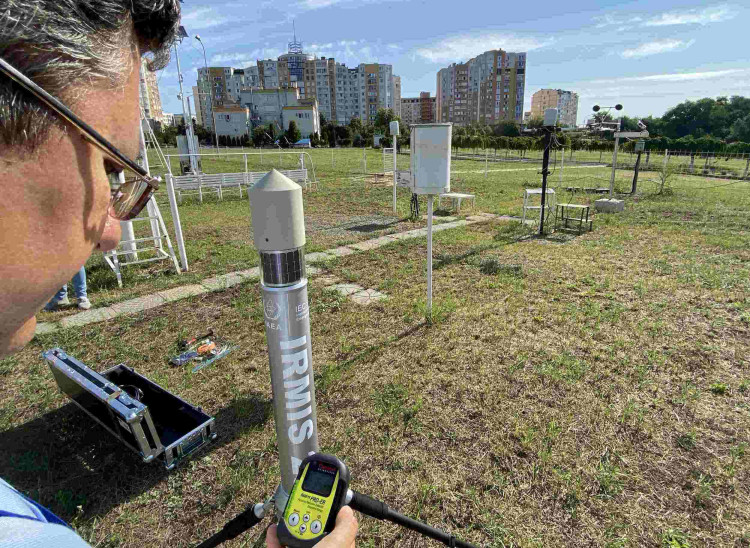IAEA experts are in Moldova this week to assist with the installation of eight Integrated Radiation Monitoring and Information Systems (IRMIS) stations. The stations will gather real-time information on radiation levels in the country, sharing the data with national authorities, and also with the IAEA's IRMIS network.
Over 6000 monitoring stations in nationally operated networks in 48 countries world-wide are already part of IRMIS. The network is designed to support the assessment of the radiological situation in each country and, in the event of a nuclear or radiological emergency, provides critical data to immediately inform emergency response decision makers.
This collaborative effort between the IAEA and Moldova showcases the importance of international cooperation in ensuring the safe and peaceful use of nuclear energy. As Moldova harnesses the benefits of these advanced monitoring systems, it sets an example for other nations to follow.
The more countries join the IRMIS, the stronger the global nuclear safety network becomes

The monitoring stations gather real-time information on radiation levels in the country, sharing the data with national authorities, and also with the IAEA's IRMIS network. (Photo: IAEA)
Welcoming Moldova's entry to the IRMIS network, Carlos Torres Vidal, Director of the IAEA's Incident and Emergency Centre (IEC) said, "the more countries join the IRMIS, the stronger the global nuclear safety network becomes. The IEC stands ready to support countries in this process, ensuring that they have the necessary resources and technical assistance to effectively implement and utilize IRMIS."
"This partnership between the IAEA and Moldova represents a significant step towards bolstering the county's nuclear safety infrastructure and ensuring the well-being of its citizens," he added.
IRMIS stations are state-of-the-art monitoring systems designed to provide comprehensive and real-time data on radiation levels and environmental parameters. Equipped with advanced sensors, these compact and versatile stations play a crucial role in assessing potential radiation threats.
IRMIS data can be routine radiation monitoring data, provided on a regular basis, as is the case with all the countries registered with the system. In addition, the data can be collected on an ad-hoc basis, for example, during a nuclear or radiological emergency. Routine data is gathered by fixed instruments that always scan the environment from the same location, while event-related data can come from any radiation monitoring instrument, provided it is linked with coordinates, dates and times.
By leveraging the IAEA's expertise, Moldova strengthens its ability to monitor radiation levels, detect anomalies, and respond swiftly to potential nuclear or radiological incidents.
Moldova recognizes the substantial benefits that the loan of IRMIS stations brings to the country, which was highlighted by Ionel Balan, Director, Agency for Regulation of Nuclear and Radiological Activities of Moldova. He said: "The installation of these advanced monitoring systems will greatly enhance our ability to ensure the safety of our citizens and environment. The real-time data provided by the IRMIS stations will enable us to respond promptly to any radiological incidents, safeguarding the well-being of our people."
Together with the Unified System for Information Exchange in Incidents and Emergencies (USIE), the IAEA IRMIS provides authorities with 24/7 access to the collected data and the necessary quantitative technical information to support a comprehensive assessment and prognosis of the radiological situation.
With the participation of Moldova, the radiation monitoring information system network has expanded to 49 countries since its creation in 2016. Currently Australia, Austria, Belarus, Belgium, Bosnia and Herzegovina, Bulgaria, Canada, Croatia, Cyprus, Czech Republic, Denmark, Estonia, Finland, France, Germany, Greece, Hungary, Iceland, Indonesia, Iraq, Ireland, Italy, Japan, Jordan, Latvia, Lithuania, Luxembourg, Malaysia, Malta, Moldova, Netherlands, North Macedonia, Norway, Poland, Portugal, Romania, Russian Federation, Saudi Arabia, Serbia, Slovakia, Slovenia, Spain, Sweden, Switzerland, Thailand, Türkiye, Ukraine, United Kingdom and United States of America are members of IRMIS.
"Experience from previous emergencies has shown us that arrangements for information sharing on radiation levels are essential. If arrangements are not in place, it can take considerable time to receive information and to process it into useful formats. IRMIS establishes permanent, proven and testable arrangements for the sharing of radiation monitoring data worldwide, so that governments can take well-informed decisions to protect people and the environment," said Florian Baciu, the IAEA Response System Coordinator.






